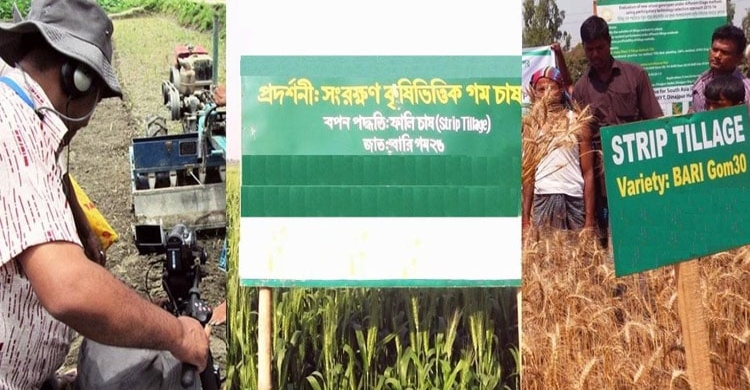Farmers reap benefits from conservation agriculture technologies


Many farmers in northern Bangladesh are reaping the benefit from adopting conservation agriculture (CA) technologies to boost crop production at a low cost, contributing to ensuring food security despite the negative impact of climate change.
Along with mechanization in agriculture, the growing adoption of CA technologies is improving the environment, ecosystems, biodiversity, soil health, and fertility, also making farming more profitable for farmers.
The Department of Agricultural Extension (DAE), Bangladesh Rice Research Institute (BRRI), Barind Multipurpose Development Authority, Wheat Research Center and other organizations are popularizing CA technologies among farmers.
Dr M A Mazid, a rice scientist and winner of the “Swadhinata Puraskar- 2018” in food security said that the widespread adoption of CA technologies at the farmers’ level will further increase crop production despite the adverse effects of climate change.
The adoption of CA technologies will become inevitable in the future to increase food production at a low cost, save water, increase crop intensification and create profitable markets for produced crops, he added.
Dr. Mazid, also a former BRRI Chief Scientific Officer, stressed on rapid dissemination of latest CA technologies among farmers and providing more subsidies for easy purchase of necessary machinery, inputs and spare parts to facilitate the process.
Chairman of North Bengal Institute of Development Studies Krishibid Dr Syed Samsuzzaman said adoption of CA technologies reduces cost for labours, fuel and irrigation and crop cultivation duration and improves fertilizer management.
“Farmers are being benefited using CA technologies like minimum tillage or strip tillage with power-tiller operated seeder machines, direct seeded rice, Alternate Wetting and Drying (AWD) irrigation method, bed-planting in light texture soil,” he said.
Md Mamunur Rashid, a PhD Fellow in the Department of Agricultural Extension (DAE) at Dinajpur Haji Mohammad Danesh University of Science and Technology, said adoption of CA technologies like AWD irrigation method is expanding in the northern region.
Farmers of the northern region are bringing more Boro rice fields under AWD irrigation technology every year, resulting in savings of up to 30 percent of irrigation water and increasing production of 0.50 tonnes of paddy per hectare of land.
“The crop rotation CA technology helps farmers sowing seeds in minimum, strip or zero tillage with some crop residue retention on soil surface for better germination with residual moistures to reduce unproductive water loss,” he said.
Superintending Engineer for Rangpur Circle of Barind Multipurpose Development Authority (BMDA) Md Habibur Rahman Khan said that significant progress has been made in the northern region in adopting climate-smart CA farming techniques.
"With the adoption of CA technologies and use of conserved surface and rainwater under various projects of BMDA, farmers are producing additional crops to significantly improve their living standards along with reviving the ecosystems," he said.
Talking to BSS, Deputy Director of the DAE's Burirhat Horticulture Centre in Rangpur city Krishibid Dr Md Abu Sayem predicted brighter prospects of CA technologies, including raised bed technology.
The eco-friendly raised bed technology increases cropping intensity and crop production through reducing the existing time gap between the two crops.
“The raised bed technology allows higher yield from 10 to 20 percent saving 30 percent irrigation water and 30 to 40 percent of seeds and fertilisers to maintain sound soil health and easing the agronomical managements in crop fields,” he said.
He said the bed planting system adopting the raised bed technology improves water distribution and irrigation efficiency, gives better results in using fertilizers, pesticides and reduces weed infestation and crop lodging and saves crops from disturbance of rats.
The experts said adoption of the latest CA agri-technologies have started making farm activities more profitable, increasing crop production to ensure food security, improving soil health, ecology and environment in the northern region.
